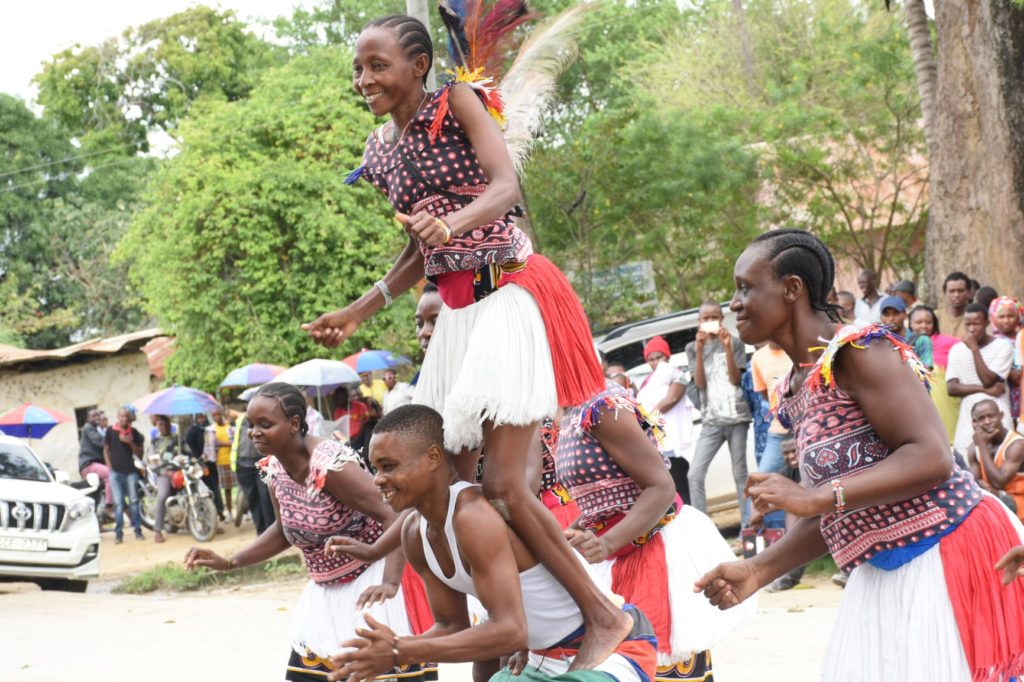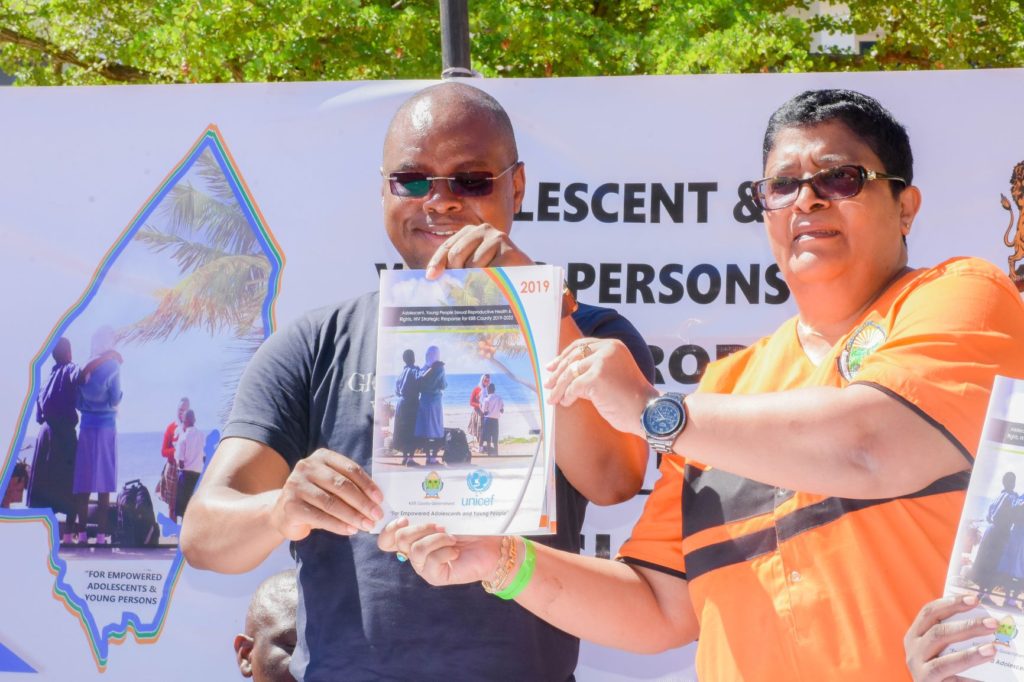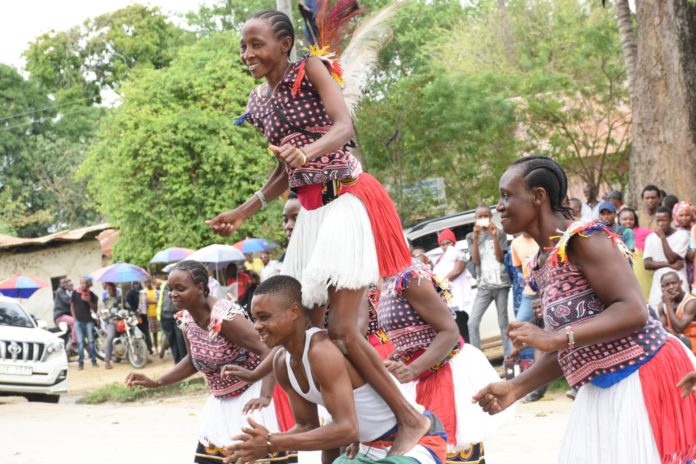By Mazera Ndurya and Gladwell Pendo
The rising number of teenage pregnancies in Kilifi County has been the talk of the County and the Nation at large with alarming statistics being released, which stirred up a heated talk on the mainstream media, Newspaper, and Social media. While some termed it as a national crisis, other stories pointed out on how the Kilifi County Government was failing on the war against teenage pregnancies.
More than 17,000 cases of teenage pregnancies were recorded last year making it one of the highest even though some leaders felt the statistics could have been exaggerated ostensibly by the Non-Governmental Organizations for their own interests.
The Member of Parliament Kilifi North, Owen Baya during the 2019 Madaraka Day Celebrations raised his suspicions that the figures being peddled by NGOs were exaggerated after a report indicating that Matsangoni is leading with 27 cases of teenage pregnancies at Kiloli Primary differed with the report given by the school headteacher that only six cases of teenage pregnancies were reported in 2018.
Reports indicate that some of the root causes of teenage pregnancies are poor parenting, cultural practices, broken families as well as inadequate education on sexuality. A qualitative study done by Faith Action Network on teenage pregnancies in Kilifi County shows that cultural practices such as weddings and funerals have played a role in contributing to teenage pregnancies.
According to their research, disco matanga, commonly known as Vuguvugu or disco vumbi, a funeral cultural practice in Kilifi where people converge to celebrate the death of their loved ones through music especially at night and the dances that take place in wedding ceremonies at night are held in areas where young people can hide and engage in sexual activities.
Moreover, young children are said to use such platforms to take drugs and alcohol. Images and videos of young girls walking into the dark to attend a disco matanga, young children dancing slackly and teenagers abusing drugs and consuming alcohol especially mnazi during Disco Matanga have been run on the media, rubbing shame on the face of the leadership in Kilifi County and the community at large.
Speaking at Matsangoni, Kilifi governor Amason Jefwa Kingi said that 90 percent of the people attending funerals are children. He singled out graphically explicit videos of children dancing irresponsibly at funerals and said that it is so unlike the olden days. He urged the people of Kilifi to go back to their traditions and instill good morals in their children.
The County Government of Kilifi has acknowledged the fact that the issue of teenage pregnancies in the County is a problem that has cost the image of the County as well as the County Government. Most striking, however, is that teenage pregnancies have drawn back the standard of education in the region as a result of a high percentage of school dropouts.
Kilifi County Government has been working round the clock to curb teenage pregnancies and create openings for education. Earlier this year, Governor Kingi appointed a task force to look into issues that affect the girl child as well as the boy child and come up with positive social change towards girl child protection and reinforce moral values by passing knowledge on sexuality and the economic liability of teenage pregnancies to the county at large.
The Kilifi County Adolescents and Young Persons Sexual Reproductive Health, Rights and HIV Strategic Plan 2019 -2020 was laid by the team and launched in April this year. The taskforce, steered by the County Executive in charge of Youth, Gender and sports, Hon. Maureen Mwangovya has been vibrant working tirelessly with Non-Governmental organization to control the disturbing numbers of pregnancies and support young mothers in the county.
The County Government through the department of Youths, Gender and sports and the department of health, organized an advocacy and Media campaign against teenage pregnancies in Kilifi County that was to run for one-month targeting teenagers, parents, teachers, opinion leaders, religious leaders and the public at large. During the launch of the activism campaign at Matsangoni, Governor Kingi said that poverty should not be an excuse for children to get pregnant. He however, urged the people to reinstate moral values in their families.

“Poverty should not be an excuse. Parents, a time has come for you to protect your children,” Kingi said.
The Governor further let out his disappointment and called for the amendment of the sexual offence act to accommodate the law of castration on men defiling young girls and increasing the rate of teenage pregnancies.
Speaking at Marereni, in a rally against teenage pregnancies in Kilifi, the Deputy Governor of Kilifi Eng. Gideon Saburi called for respect of children by adults and warned children against engaging in pre-marital sexual activities which may lead to complications during birth or even affect the unborn child.
“Let the children remain children and wait for their time. When the reproduction cells are not mature, the health of the unborn baby may be put at risk,” Saburi said.
Saburi further expressed the County Government’s commitment to fighting teenage pregnancies and called upon the national government, NGOs and the residents in Kilifi County to work together so as to succeed in ending teenage pregnancies in the county.

On one of County advocacy rally against teenage pregnancies at Juhudi Primary School, Hon. Mwangovya assured citizens that the team will investigate the root cause of teenage pregnancies keep enlightening the community on the effects of the threat.
The County Executive in charge of Health Dr. Anisa Omar on the other hand brought an interesting but also worrying twist on the rising number of teenagers contracting HIV and AIDS and admitted that it is a strain to the budget allocated to the health department despite the county Government setting aside a large share for the department to fight the threat. She, however, called upon parents and leaders to work together in the war against teenage pregnancies.
Having a meaningful engagement of the youths in making implementations and reviewing of policies, the County Government of Kilifi in partnership with Reproductive Health Network Kenya (RHNK) hosted the 3th Annual Scientific Conference on Youths and adolescents 2019 at Temple Point, in Malindi to involve youths on the discussion of matters that affect their choices, for instance reproductive health. During the flag-off of the caravan to the conference, Dr. Anisa Omar said that youths are faced with so many challenges and insisted on taking care of the youths.
“Apart from teenage pregnancies and sexually transmitted diseases, there is mental depression, anxiety disorders, and obesity. We now focus more on taking care of the youth,” said Dr. Anisa
Among other strategies put in place by Kilifi County government in the campaign against teenage pregnancies is the engagement of teenagers in sports activities in their schools and in the community. Speaking at Matsangoni primary school, Mwangovya said that sports would keep children busy and engaged hence keeping then off immoral activities. She argued that sports in schools especially in the evenings would leave the children tired and eager to rest hence not in the mood to engage in other activities that are not right. She also said that using sports to fight teenage pregnancies is a way of nurturing talents in the county.
“We would love to have our own Mariga and Wanyama in Kilifi County. We would love to compete with big teams such as Manchester United,” Mwangovya said.
The war against teenage pregnancies in Kilifi County has had a number of challenges. The ban of Disco matanga, which was effected last year, has caused an uproar among the residents of Kilifi who claim that discos are a source of income to the disco operators. The uprising went to the extent of injuring chiefs and police officers by supporters of disco matanga. One of the violent cases was experienced at Shariani where David Kahindi, an area chief, his assistant, and three police officers were assaulted by furious youths after they tried to stop a disco matanga. To date, there are still hiccups in the ban of disco matanga with residents claiming that it has affected the process of raising money for expenses in funerals because fewer people show up at night due to boredom yet it is not the ultimate cause for teenage pregnancies in Kilifi.
The recent plan by the county government to ban the sale of mnazi around homesteads as one way of curbing teenage pregnancies, has also been met with clear opposition from the residents saying that the County Government should explore other issues such as the changing technological trends that truly cause teenage pregnancies rather than shutting down people’s means of earning a living.
Kahindi Charo, a driver and a resident at Tezo, says that the emergence of mobile phone technology has got into the way of parent- child relationship and brought a major hindrance to the parenting role.
“Nowadays it is so hard to keep track of what our children consume on phones because the time we spend with them at home is less compared to the time they spend at school and with the exposure there, God knows what they see!” Kahindi said.
Kahindi who is a father to a teenage girl in form one, who schools in Kisii County says that personally he cannot afford to buy a mobile phone for her daughter, but at school she interacts with other girls from different backgrounds some of whom might be rich and possessing expensive mobile phones than his own make. From there they can make calls to their male friends and access the internets to watch pornographic content and may end up experimenting.
Manasseh Kitsao, a resident in Kiwandani and a father to a girl in Grade 1 says that in this generation, phones, television and video games have caused a rift between parents and children. He says children spend most of their time on their phones trying to find solutions to their problems on the internet while others get their frustrations out on video games rather than sharing with their parents.
“Parents should minimize the time which their young children spend on these gadgets and create more time with them,” Manasseh said.
Manasseh added that parents should try to monitor what their watch on TV to prevent them from consuming content that will mess with their heads at an early age.
“My daughter started asking me weird questions that got me embarrassed to answer and when I asked why, she said she watched that on TV,” he said.
According to Manase, it is not only the children that spend much time on their phones but also parents. He says parents spend their free time at home while on social media catching up with friends and reading gossip hence end up forgetting that their children are also observing.
Mnazi dens popularly known as mangwe in Kilifi have existed for a long time, most of them located around undesignated areas. Some of these dens are located in homesteads where children are raised. Mangwes have been known to be places where people drink irresponsibly and speak loosely as well as do reckless acts such as using drugs.
According to the area chief Ngerenyi, Mrs. Tekla Chai, mnazi dens have been a problem escalating teenage pregnancies in Kilifi for a long time. Tekla requested the county government to intervene and deal with the licensing of Mangwes.
“We shall conduct a patrol and arrest children and their mothers in Mangwes. I ask the county government to help in licensing of Mangwes,” Tekla said.
Nowadays, Mangwes have been flooded with youths who have taken into taking alcohol. Young girls walk into Mangwes and even get employed as sellers hence interacting freely with drunkards, some of whom are amorous and end up sexually abusing them.
Zosi Mwayaa, a seller of mnazi at Tezo and a mother who stays with her children at her place of business says that she does not object the county governments plan to ban the sale of mnazi but since she has been providing for her children, buying them clothes and educating them through the sale of mnazi, she would have no other alternative to earn a living.
“I don’t object the ban but I have kids to feed and educate. The county government should then create employment for us,” Zosi said.
The genesis of Disco matanga
Disco matanga also known as siniriche, disco vumbi or vugu vugu is a dance ceremony in honor of the dead. During disco matanga, mourners converge in funerals mostly at night, to dance to now hits of modern Christian and secular music, in celebration of the life lost.
Most common at the coastal region in Kilifi and Mombasa County, disco matanga runs so deep in history. Long before the wave of disco matanga, funerals celebrations were purely done in the traditional way. In Kilifi County among the Giryama community, a type of songs called kifudu were sang during funerals and only elders were involved.
Disco matanga was initially known as disco vumbi because it played during celebrations such as Christmas and other public holidays where disco operators constructed structures in town centers and let in people to dance at a fee. At this time, a little restriction of age was still there. These discos became common and many that there was hardly enough market so they extended to weddings then later to funerals where they got the name disco matanga. That is how disco matanga picked more followers including young children and now they have turned to scenes of irresponsible behaviors and deemed to escalate teenage pregn














